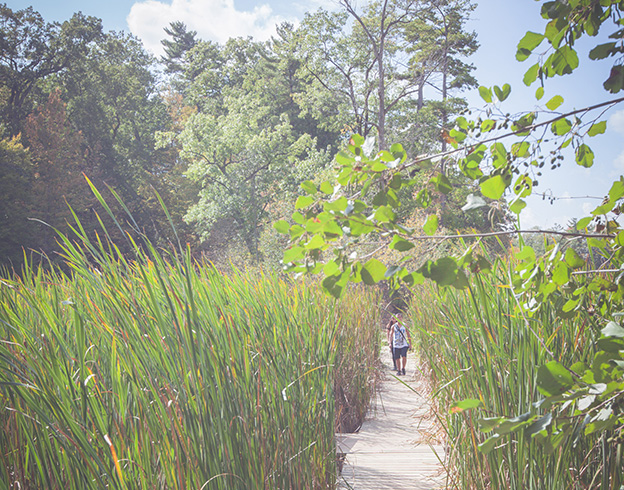McMaster to launch new series of mental health programs

So-called 'mood walks' are just one of the many new programs soon to be offered as part of the University's Arrive and Thrive program.
A group session on mindfulness. A walk in the woods. A co-operative game of scavenger hunt.
McMaster is rolling out a series of pilot programs aimed at building positive and healthy coping and discouraging unhealthy coping and addictions, then seeing what works best for the University community.
The 18-month Arrive and Thrive pilot project is supported by the province’s Mental Health Innovation Fund, which supports new and innovative approaches to student mental health and addictions.
At McMaster, that includes programs like Walking in Nature Days (WIND), which helps students take advantage of the University’s natural surroundings – something research suggests may promote good mental health and reduce addictions.
Other programs include COG, a series of co-operative outdoor adventure games, a four-week program called Exploring Change that helps students target and change a variety of behaviours, and a mindfulness class known as Koru.
Organizers will be evaluating the programs for effectiveness over the course of the pilot.
“We want to find out how well the programs work by evaluating them” says Allan Fein, the research and project co-ordinator with the Arrive and Thrive Program. “And we’ll also be looking at whether these programs are a good fit for the McMaster community.”
The centre will also soon launch Pause, an opportunity for students to meet individually with a trained counsellor to talk about their smoking, alcohol or marijuana use, and Arrive and Thrive Online, an online tool aimed at helping incoming and current students to identify potentially unhealthy habits and to learn about how they might change them.
The Arrive and Thrive team is led by Dr. Catharine Munn, in partnership with the Student Wellness Centre, The Boris Centre for Addictions at St. Joe’s Hospital, McMaster Athletics and Recreation, Alternatives for Youth, the Hamilton-Wentworth District School Board and many other campus and community partners.
More than a third of all visits to the Student Wellness Centre are related to mental health, and a 2015 survey showed that more than 70 per cent of McMaster students say they would consider seeking the services of a counselor.
“Post-secondary students are coming in large numbers to their campus health and counseling centres, with concerns about their mental health and problems related to substance use and other habits, like pot use, gambling, and gaming”, says Dr. Catharine Munn, who lead psychiatrist at the Student Wellness Centre. “This program will help us discover and provide more tools to help students avoid and overcome addictions and find success in academics and in life”.
Those interested in any of these mental health programs can email arriveandthrive@mcmaster.ca for details.

